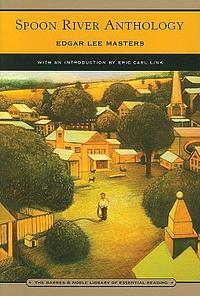Take a photo of a barcode or cover
funny
inspiring
reflective
fast-paced
Went into it completely blind and was both bored and intrigued by the characters and conceit in turn
While prepping for a lesson on Edgar Lee Masters for my American Lit class this week, I thought “What the heck. Why not read it all finally instead of letting the internet tell you what bits are best?” I’ve only ever read selections from Spoon River Anthology, so this was my first jaunt into the whole collection. I love the concept and the creativity behind Masters’s use of epitaphs to tell the story not just of individuals, but of an entire town. We are knee deep into our Realism unit so this one definitely ticked all the boxes for the time period comes from. It was funny and tragic and definitely worth the read.
I imagine these poems were more shocking in 1915 when more people had the illusion that small town Americana was quaint, wholesome, and basically straight out of a Norman Rockwell painting. Still, I think the collection’s overarching refrain of people feeling a lack of control over their lives and being deeply unsatisfied with their legacies is just as relevant today as it was a hundred years ago.
Typically a 5 star for me, but I read the audiobook this time and struggled a little with the narrator - would highly recommend the physical book. This is a poetry book all about the lives of everyone in a small town, written from their graves. Full of secrets and scandals and family drama, but in short little poems from each person, I love the interconnection and their stories!
emotional
reflective
fast-paced
dark
emotional
funny
lighthearted
mysterious
reflective
slow-paced
I really love the concept of this book. I thought there were very few poems that would work as stand-alone pieces, but I thought the way the characters were in conversation with one another was fantastic. I imagine that I might find even more connections and thereby like the book better with re-reading, though I can't promise I'll actually follow through with testing that theory. As a writer, I was very inspired to translate some of the ideas going on here to my own work, so I'm glad I finally got to it.
«Era superproibito quel libro in Italia. Parlava della pace, contro la guerra, contro il capitalismo, contro in generale tutta la carica del convenzionalismo. Era tutto quello che il governo non ci permetteva di pensare [...], e mi hanno messo in prigione e sono molto contenta di averlo fatto.»
Sono le parole di Fernanda Pivano, la prima a tradurre L’Antologia e che pagò la traduzione con il carcere.
L’antologia di Spoon River racconta attraverso epigrafi la storia degli uomini e delle donne che vivono a Spoon River, sono storie d’amore, di uccisioni, di rapine, di corruzione e di libertà.
In poche righe vengono delineati personaggi, per lo più inventati, mossi da emozioni reali e vive. Personaggi che parlano attraverso frasi scritte sulle loro tombe, che continuano a essere vivi anche dopo la morte.
Non deve sorprendere che l’antologia di Spoon River sia una delle raccolte di poesie con maggiore successo.
Sono le parole di Fernanda Pivano, la prima a tradurre L’Antologia e che pagò la traduzione con il carcere.
L’antologia di Spoon River racconta attraverso epigrafi la storia degli uomini e delle donne che vivono a Spoon River, sono storie d’amore, di uccisioni, di rapine, di corruzione e di libertà.
In poche righe vengono delineati personaggi, per lo più inventati, mossi da emozioni reali e vive. Personaggi che parlano attraverso frasi scritte sulle loro tombe, che continuano a essere vivi anche dopo la morte.
Non deve sorprendere che l’antologia di Spoon River sia una delle raccolte di poesie con maggiore successo.
I don't think I understood all (or even half of it). I loved the concept but struggle with poetry in general. The passages I did understand were brilliant. I am glad I read it, once.


